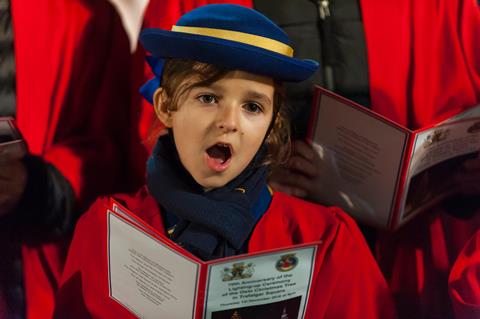Deck the Hall offers a blend of scholarly research and accessible storytelling - revealing the surprising origins of 27 beloved Christmas carols

Spoiler alert! If you don’t want to sully your experience of singing ‘O Little Town of Bethlehem’, don’t read this book and find out that the original tune was about a dead cow and a delinquent ploughboy, who was carried off to hell by a genie. Ah, too late, I’ve told you now…
But if you relish background details, you may love this tremendously comprehensive coverage of 27 carols across 321 pages. Each chapter in Deck the Hall by Andrew Gant, dives into the history of the lyrics and their accompanying tune(s), complete with simple sheet music and some relevant illustrations.
Gant is a composer, conductor, singer and Oxford University lecturer, whose extensive musical experience includes leading the choir at many state events. His extensive research gives the book an academic feel, yet keeps it accessible, appealing particularly to serious music scholars without alienating the casual reader.
There is certainly more information given here than most readers will need. As Gant traces the history of ‘Of the Father’s Heart Begotten’ from its fourth century roots, he tells us that “the 1906 version is in the Lydian mode, using the raised fourth degree of the scale, so that the first four notes make an upward scale of three whole tones, outlining an augmented fourth.” Indeed.
But this clearly comes from a love of his subject and Gant’s tone is warm throughout - although it is chillier when he comments on Cecil Frances Alexander’s highly dated Victorian tendencies in the ‘Once in Royal David’s City’ chapter.
While regular hymn singers will know that Alexander also wrote ‘All Things Bright and Beautiful’ and ‘There is a Green Hill Far Away’, they may be unaware that these are all rooted in liturgical phrases. ‘Once in Royal David’s City’ is based on the creed, specifically the line “Who was conceived by the Holy Ghost, born of the Virgin Mary”.
Gant gives us more than just basic background to these carols. When he writes about ‘In the Bleak Midwinter’, he tells us not just that its words were first published in the New York magazine Scribner’s Monthly, he also highlights other articles featured in the publication describing it “not so much a magazine as an encyclopaedia”.
Gant’s motivation is primarily musical, but he is literate enough in faith matters to report theological concerns. He counters the words “Heaven cannot hold him…” ‘In the Bleak Midwinter’ with lines from Revelation and John Donne. Strangely though, while he admires Rossetti’s bravery in repeating the word ‘snow’ five times in nine words, he doesn’t question the likelihood of that kind of weather at Jesus’ birth.
For all his coverage of popular seasonal carols, Gant seems most enthusiastic about ‘Tomorrow is my Dancing Day’ from the section, ‘Carols of the Whole Christian Year’, praising how it challenges the more puritanical tendencies of its time by reflecting how the Bible’s intimate imagery emphasises God’s love of his physical creation and incarnation.

You can’t discuss carols without exploring their folk origins, and the author displays an impressive knowledge of that genre. Cecil Sharp, a pioneer collector of folk tunes, travelled widely to hear and record them for posterity, but Gant is not cowed by his reputation, questioning why Sharp’s Appalachian collection “ignores Black singers, from whom he took down just two of his 122 published songs”.
The coverage of folk and carols expands into broader historical sleuthing, as Gant notes the wars and politics that influenced several songs. A number of names come up regularly, and the book would be a fine starting point for those who want to investigate intriguing characters like ‘Onward Christian Soldiers’ writer Sabine Baring-Gould, whose centenary celebrations have been toured during 2024.
And there is some surprising trivia. For example, did you know that Silent Night has “its own website (listing, among other things, translations into, at the last count, three hundred languages and dialects, though these include Klingon” ?
But for more fascinating details, you’ll have to read the book.
Deck the Hall by Andrew Gant is out now.






































No comments yet